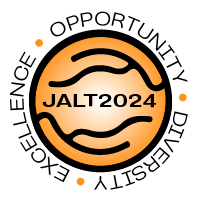Meeting Reports
Reports of our meetings. Click on a heading to see details.
- Reports for meetings prior to July 2008 can be found in the JALT National meeting archives.
- If you are looking for details of upcoming meetings, these are available on our schedule page.
- Click on an event title to see the original meeting announcement for that event.
What Can Younger Learners Teach Us? Zack Robertson Robertson explained the cognitive development stages of young English language learners (YELLs) acquiring their first language, then differences in language learning/acquisition processes between children and adults. He ran us through various physiological/neurological, psychological/cognitive and sociolinguistic patterns that are emerging currently in the...
FAB 5 (International Conference) Various presenters Fab 5 started, as usual, with online required and recommended pre-reading to "get everyone on the same page". Friday afternoon and evening featured an advanced workshop exclusively for presenters and those enrolled in the certificate course. Saturday started with examinations of connections between memory...
English Circles and the ELF Class Michael Philips Philips reviewed his pechakucha presentation, English Circles (November 2013) to continue a discussion of including world Englishes in teaching English as a Foreign Language (EFL). English Circles are the different conceptual layers—or varieties—of English as a Lingua-Franca (ELF), with non-native English speaking...
Principles of vocabulary acquisition: How well do textbooks do? Rob Waring Foreign teacher frustration in junior and high schools at forced student memorization of outdated unused vocabulary (and syntax)—usually administered by colleagues entirely in Japanese, right from ‘sit down' and ‘open your books'— was vindicated by Waring's comment, "It's insane",...
Task-Supported Language Teaching: Factors for communication and grammar use Colin Thompson Thompson gave us Rod Ellis' definition of a task as an activity that requires learners to use language with an emphasis on meaning to attain an objective—not simply as conversation. There are four criteria: it focuses on meaning; there...
Connecting Neuroscience and ELT: What we learned in 2013 Robert Murphy, Rick Eller, Zack Robertson, Joe Simpson After telling us about the recent neurolinguistic conferences in Quito and Boston, Murphy introduced a list of 42 maxims that have been synthesized with colleagues (http://fab-efl.com/) from hundreds of books and scientific articles...
Doing data analysis: Some tools and techniques Paul Collett, Trevor Holster Collett gave us an introduction to the R statistical package. With a huge user base of smart statisticians, R is also much cheaper than comparable programs; it's free and easy to download (one click for Mac) and use, though...
Online Reading and Vocabulary Environments – present and future Rob Waring Waring organized his presentation into three parts. In part one, he reviewed the current online reading environment, first noting how common reading online has become across many markets, while pointing out the plus and minus features of reading online....
Language Codes: Helping teachers decode the "L" in JALT Michael Phillips Introducing himself via "googlegangers" to kick off a light-hearted sampling of aspects of linguistics as an alternative to the usual microanalysis dictated by our profession, by stepping back and looking at the big picture of what language really is,...
Testing Interactional Speaking - A workshop Alun Roger Alun Roger briefly touched on the history and evolution of this "small-talk" testing program; his immediate concern was training his audience in the step by step process of how to administer it-- hoping for argument and disagreement from us to facilitate understanding....

